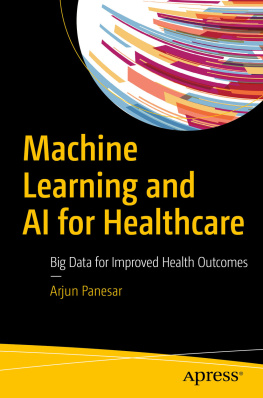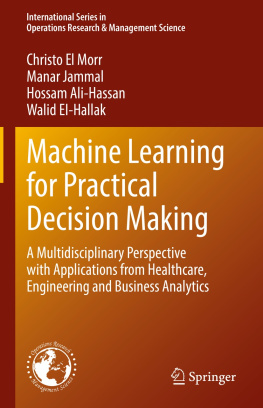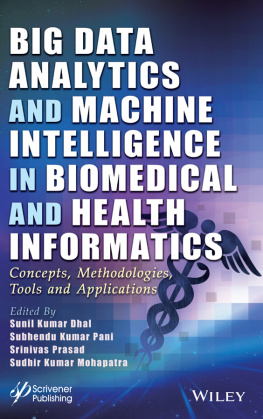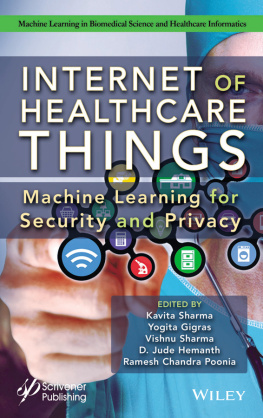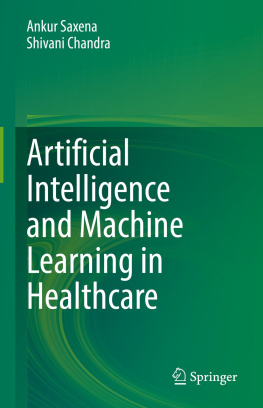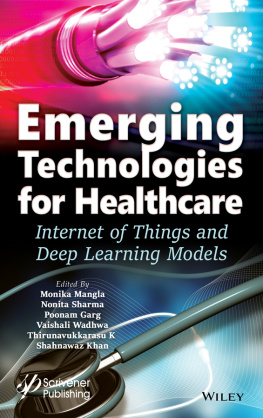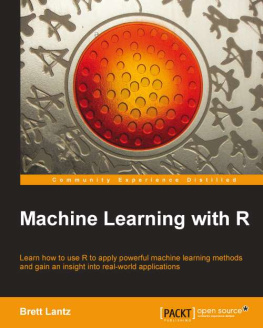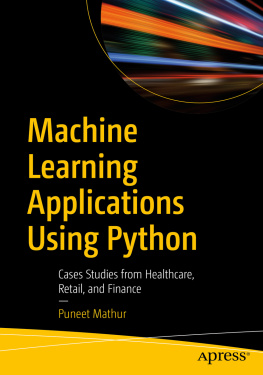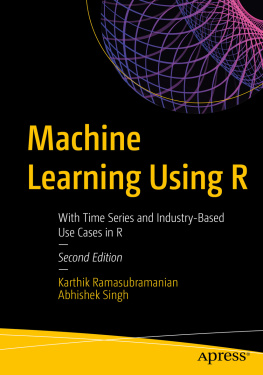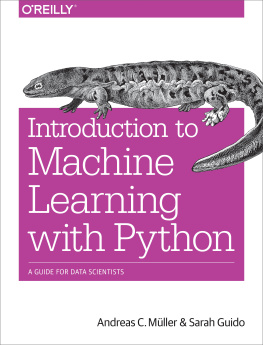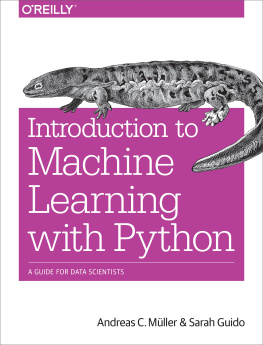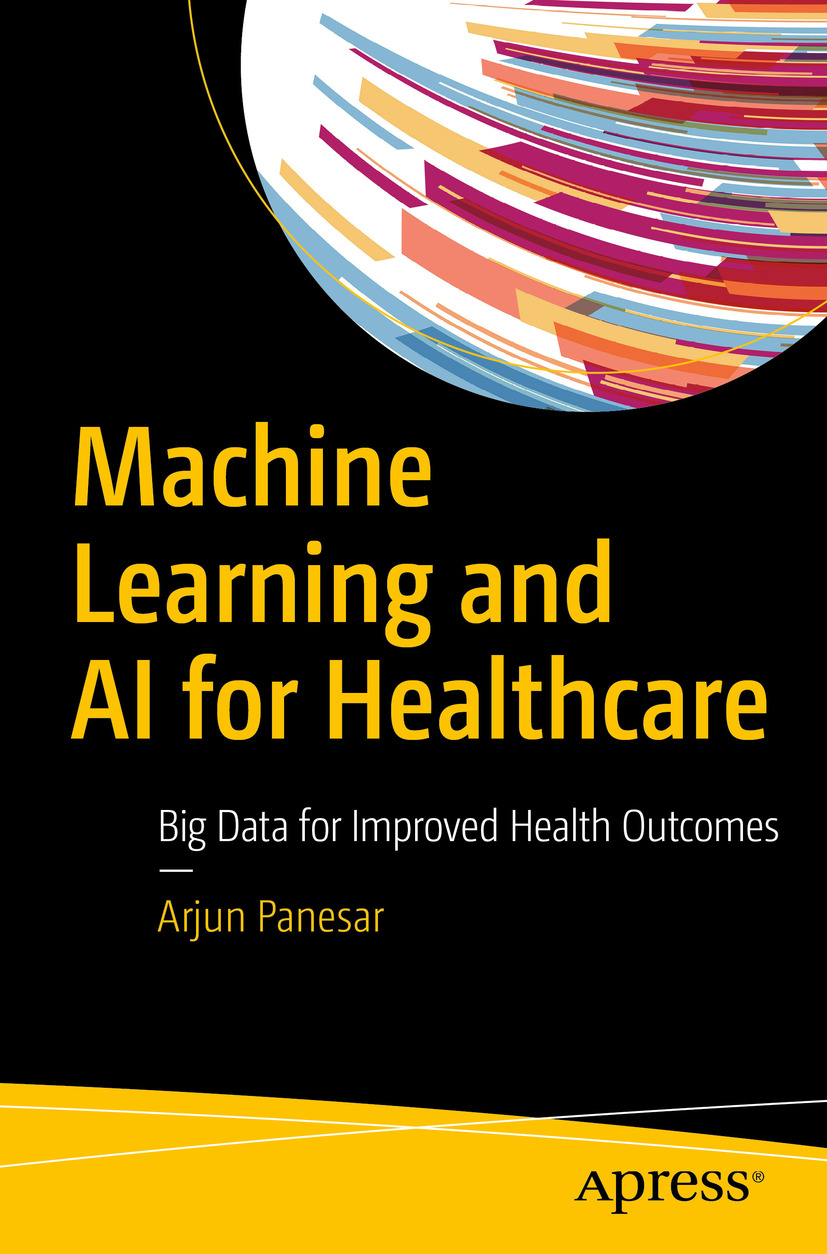Arjun Panesar
Machine Learning and AI for Healthcare Big Data for Improved Health Outcomes
Arjun Panesar
Coventry, UK
Any source code or other supplementary material referenced by the author in this book is available to readers on GitHub via the books product page, located at www.apress.com/978-1-4842-3798-4 For more detailed information, please visit http://www.apress.com/source-code .
ISBN 978-1-4842-3798-4 e-ISBN 978-1-4842-3799-1
https://doi.org/10.1007/978-1-4842-3799-1
Library of Congress Control Number: 2018967454
Arjun Panesar 2019
This work is subject to copyright. All rights are reserved by the Publisher, whether the whole or part of the material is concerned, specifically the rights of translation, reprinting, reuse of illustrations, recitation, broadcasting, reproduction on microfilms or in any other physical way, and transmission or information storage and retrieval, electronic adaptation, computer software, or by similar or dissimilar methodology now known or hereafter developed.
Trademarked names, logos, and images may appear in this book. Rather than use a trademark symbol with every occurrence of a trademarked name, logo, or image we use the names, logos, and images only in an editorial fashion and to the benefit of the trademark owner, with no intention of infringement of the trademark. The use in this publication of trade names, trademarks, service marks, and similar terms, even if they are not identified as such, is not to be taken as an expression of opinion as to whether or not they are subject to proprietary rights.
While the advice and information in this book are believed to be true and accurate at the date of publication, neither the authors nor the editors nor the publisher can accept any legal responsibility for any errors or omissions that may be made. The publisher makes no warranty, express or implied, with respect to the material contained herein.
Distributed to the book trade worldwide by Springer Science+Business Media New York, 233 Spring Street, 6th Floor, New York, NY 10013. Phone 1-800-SPRINGER, fax (201) 348-4505, e-mail orders-ny@springer-sbm.com, or visit www.springeronline.com. Apress Media, LLC is a California LLC and the sole member (owner) is Springer Science + Business Media Finance Inc (SSBM Finance Inc). SSBM Finance Inc is a Delaware corporation.
Dedicated to the giants on whose shoulders we stand. They laid the foundations with hard work, determination, blood, sweat, sacrifice, and tears. Tribute to the foremothers and forefathers; Kirpa, Ananta.
Introduction
The world is changing. There are more phones than people in the world, and it is increasingly connected. People use virtual assistants, self-driving cars, find partners through digital apps, and search the Web for any symptom of ill health. Each digital event leaves a digital exhaust that is datafying life as we know it. The success of many of the worlds most loved services, from Google to Uber, Alexa to Netflix, is grounded in big data and optimization.
Although medicine has been receptive to the benefits of big data and AI, it has been slow to adopt the rapidly evolving technology, particularly when compared to sectors such as finance, entertainment, and transport: that is, until now.
Recent digital disruption has catalyzed healthcares adoption of big data and AI. Data of all sorts, shapes, and sizes are used to train AI technologies that facilitate machines to learn, adapt, and improve on their learning. Academic institutions and start-ups alike are developing rapid prototype technologies with increasingly robust health and engagement claims. The blending of technology and medicine has been expedited by smartphones and the Internet of Things, which is facilitating a wealth of innovation that continues to improve lives. With the arrival of health technology, people can monitor their health without the assistance of a healthcare professional; healthcare is now mobile and no longer in the waiting room.
At the same time, the worlds population is living longer, and unhealthier, than ever: and in a financial crisis. Healthcare services are turning to value-based and incentivized care as non-communicable diseases such as type 2 diabetes and obesity become global pandemics.
Data is proving an invaluable tool in improving health; information is empowering. Data science, the science of big data, its analysis, and intelligent programming layers has now become a pillar to achieve traction and success in healthcare. Digital health can democratize and personalize healthcareand data is the golden key. This comes at the same time as a growing appetite to measure and quantify more aspects of human life.
Data insight and real-world evidence are facilitating rapid technology innovation that regulators are struggling to keep up with. The consequences of digital health democratization have not only a health impact but also ethical implications. Big data and machine learning enable stakeholders to uncover hidden connections and patterns, including predictions of the future. The effects of understanding this data have moral and legal consequences that require appropriate governance to mitigate risk and harm.
Healthcare providers, individuals, and organizations all house a fountain of data that can be used for machine learning. Many people have a fair idea of what they would like to learn from data but are unaware as to how much data is required and what can be achieved before more technical aspects of uncovering hidden patterns, trends, and biases are found.
This book takes a practical, hands-on approach to big data, AI, and machine learning and the ethical implications of such tools. We cover the theory and practical applications of AI in healthcarefrom where and how to start to applying machine learning techniques and evaluating performance. The book concludes with a series of case studies from leading health organizations who utilize AI and big data in novel and innovative ways.
Acknowledgments
This book would not have been possible without the patience, tolerance, and encouragement of many people. First and foremost, eternal gratitude to my parents and grandparents, who migrated to foreign lands carrying nothing but hope, endured unimaginable hardships, and gave us the world.
A huge thank you to the Diabetes Digital Media teamparticularly Amar, Harkrishan, and Domwith whom many discussions on the future of artificial intelligence (AI) were had. Thank you to Krystal for creating beautiful imagery to complement the book.
Thank you Ashish Soni, for the meticulous detail and technical rigor you brought to this book and the fantastic team at ApressDivya, Celestinfor your encouragement, support, and motivation.
Finally, thank you to time: what a funny old thing. Dedicated to the infinite majesty of Kirpa, Ananta, and Charlotte.
Table of Contents
About the Author and About the Technical Reviewer
About the Author
Arjun Panesar
is the founder of Diabetes Digital Media (DDM), who operate the worlds largest diabetes community and provide evidence-based digital solutions. Arjun holds a first-class honors degree (MEng) in Computing and Artificial Intelligence from Imperial College, London. Benefiting from a decade of experience in big data and affecting user outcomes, Arjun leads the development of intelligent, evidence-based, digital health solutions that harness the power of big data and machine learning to provide precision healthcare to patients, health agencies, and governments worldwide.

